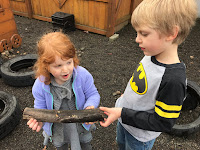We had a definite explosion of math at The Gan this week.
We often sing about 3 green and freckled frogs, 5 apples (or other fruit of choice) in trees falling off 1 by 1, and 5 ducks going off to play. At lunch this conversation occurred.
Lochlan: When the 3 frogs are on the log and 1 jumps off and 2 are left that is subtraction.
Moshe: Yeah one is gone in the pond.
Emily: And the ducks that go away.
Lochlan: Yeah that is subtraction too, 5 go then 4 come back.
Emily: Yeah.
Moshe: And the apple tree. We shake that tree and the apples drop.
Morah Katie: I think you have all just realized we have been singing subtraction songs.
The children had math on their mind, whether they knew it or not.
They were drawn to the blocks, laying the foundation for mathematical thought such as spacial and patterning skills, as well as general cognitive skills.
On the playground, Makayah began asking about addition,
Makayah: What is 6+4?
Morah Katie: Let's open the food store and find out.
We have found for the seeds of mathematical thinking to take root, it is important for children think about the idea of number with quantities of objects which are meaningful to them.
Every day the Helper of the day takes "roll/attendance" by counting everyone gathered for group at the blue mat.
With the help of 2 friends, the Helper then sets up and prepares the snack table for the number of friends who are present.
This is an important and meaningful experience.
The helper is providing a place for all the friends to gather for snack. It is an appreciated responsibility.
When it comes to counting, disagreements about correct answers may arise.
Rather than simply providing the correct answer, the children involved may hear the question: Can you show me how you got your answer?
The child is then able to demonstrate their thought process, and share their knowledge.
Often times, repeating the counting experience allows for self correction.
When self correction does not occur, a child might hear from a morah: I get a different answer, lets each try again and see what we come up with.
This "double check" allows the child to rethink a strategy, or perhaps simply slow down in the activity.
What is important is that the child is provided with an opportunity to repeat the process and/or reexamine their ideas.
What is important is that the child is provided with an opportunity to repeat the process and/or reexamine their ideas.
Children encounter math throughout the day.
The labeled materials allow the the children to direct themselves in the use of the community materials, while reinforcing their understanding of quantity.
The specific math materials assist the child's need to organize, classify and rank objects.
The labeled materials allow the the children to direct themselves in the use of the community materials, while reinforcing their understanding of quantity.
The specific math materials assist the child's need to organize, classify and rank objects.
Every hands-on, sensorial impression they experience is filed away in their mind to be recalled later.
Logical and mathematical thinking is an internal process, in which the child needs to build relationships and connections in their world.This can only be done and achieved at the child's pace and interest.
Our job as teachers is to focus on and support the process of this construction, rather than the results. When the results are clearly happiness and pride, it is a definite honor to witness them.

































No comments:
Post a Comment
Note: Only a member of this blog may post a comment.